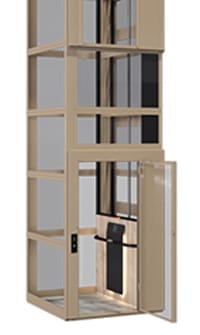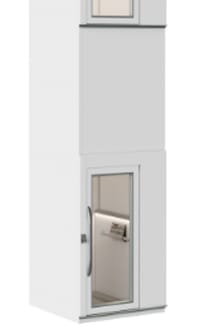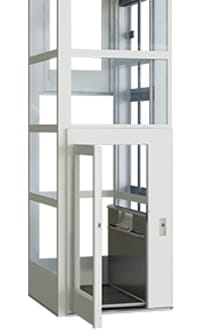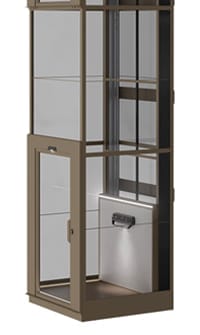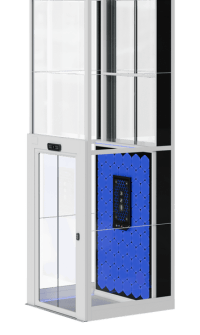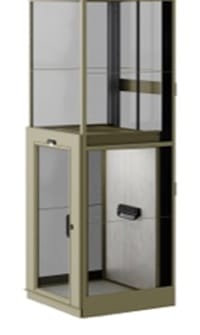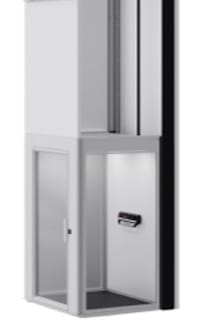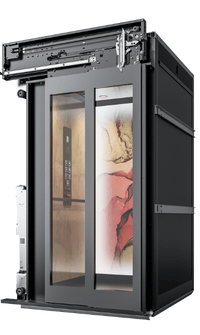What Is an Elevator Pit? (And Why Cibes’ Screw-Driven Lifts Often Don’t Need One)
Table of Contents
TL;DR:
An elevator pit is the recess below the floor for lift machinery. Traditional elevators need deep pits (≈1 m), causing high construction and waterproofing costs. Cibes screw-driven home lifts solve this with a shallow pit (50–70 mm) or a pitless ramp design, giving homeowners a faster, safer, and space-saving installation, without a machine room.
-
Traditional elevators → deep pit (≈1 m), heavy construction, waterproofing issues.
-
Cibes lifts → shallow pit (50–70 mm) or pitless ramp, no machine room.
-
Result → fast, clean, space-saving installation.
If you’re researching home lifts or elevators, you’ll see the term “pit.” In elevator design, the pit is the recess below the lowest landing. It gives space for the underside of the car, safety gear, and service clearance so the car can stop level with the lowest floor and technicians can work safely. Commercial elevators often require a deep pit. Modern home lifts, especially screw-driven systems from Cibes, are engineered to work with a very shallow pit or no pit at all (using a small ramp).
Why Elevators Have a Pit
A pit solves four practical needs:
- Level flooring at the lowest stop: lets the car floor finish flush with the slab.
- Safety clearance: provides protected space under the car for servicing.
- Mounting for devices: buffers, final limits, and under-car components.
- Water management: room for waterproofing details or a sump where required.
In conventional traction or hydraulic lifts this can mean ~1 m or more of pit depth. The building must be recessed, waterproofed, and inspected before the lift goes in.
Typical Pit Depths: Commercial vs. Home Lifts
- Commercial traction/hydraulic: deep pits (often around a meter or more) to meet high-speed and buffer requirements.
- Modern residential: shallow pits measured in centimeters because travel speeds are lower and the equipment is compact. Cibes’ residential ranges are designed around shallow pit (often 50–70 mm) or 0 mm with a ramp at the lowest landing.
Key point: pit requirements are product-specific. Always check the manufacturer’s data sheet and local code.
The Cibes Advantage: Screw-Driven, Shallow-Pit (or Pitless) by Design
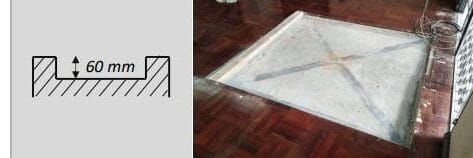
Elevator pit required for Cibes
Cibes Lift uses a screw-driven drive train (EcoSilent™) across its home-lift portfolio. This matters for the pit question:
- Minimal civil works: The screw-drive geometry and integrated car frame reduce the under-car space needed. Most residential installs work with a 50–70 mm pit; when a recess isn’t possible, a small threshold ramp achieves 0 mm pit.
- Machine-room-less : No separate machine room. The drive is self-contained in the shaft, shrinking the structural scope.
- Fast retrofits: With no deep excavation and no machine room, installations are measured in days (≈5–15 days)once the site is ready.
- Clean, oil-free operation: Screw-driven systems avoid hydraulic oil and associated maintenance risk.
- Quiet, consistent ride: EcoSilent™ keeps noise low and travel smooth at residential speeds (~0.15 m/s).
For existing homes with post-tensioned slabs, flood-prone ground floors, or tight schedules, these attributes are decisive. You avoid heavy demolition, lower waterproofing risk, and shorten project time.
When an Elevator Pit Still Helps
You may still choose a shallow pit if you want perfectly flush entry at the lowest landing and prefer not to use a ramp. Some authorities or certifiers also request a minimum recess. Even then, the Cibes requirement is shallow compared with commercial norms.
What Lives in the Elevator Pit (and How Cibes Minimizes It)
Conventional pits hold buffers, final limit switches, and provide refuge space. Cibes optimizes under-car geometry for residential speeds so these functions fit within a very small recess. That’s how you get shallow-pit or pitless options without compromising leveling or safety.
Shallow-Pit and Pitless in Practice
Use cases where shallow/pitless shines:
- Retrofits in townhouses, duplexes, or villas where cutting deep recesses isn’t feasible.
- Suspended slabs and post-tensioned floors that you don’t want to disturb.
- Outdoor/semi-outdoor locations where waterproofing a deep pit would be high risk.
- Tight programs where a small civil scope and fast install are mandatory.
Cibes lifts also ship with their own prefabricated shaft (metal or panoramic glass). That removes the need to build a custom shaft and further reduces site work.
Pros and Cons of an Elevator Pit at a Glance
Deep pit (traditional elevator):
Pros: conventional components, high-speed capability.
Cons: heavy structural work, waterproofing risk, longer timeline, often a machine room.
Cibes screw-driven, shallow-pit/pitless home lift:
Pros: minimal civil works, no machine room, 50–70 mm pit or 0 mm with ramp, fast install, oil-free, quiet.
Cons: residential speed/class by design; check model limits for size and finishes.
Technical Comparison: Traditional vs. Cibes Elevator Pit Depth
For architects, builders, and homeowners, the difference in structural requirements is a critical factor. Here is a direct comparison of the pit dimensions and what they entail:
| Feature | Traditional Hydraulic/Traction Lifts | Cibes Screw-Driven Platform Lifts |
|---|---|---|
| Typical Pit Depth | 1000 - 1500 mm (1 - 1.5 meters) | 0 - 70 mm |
| Construction Work | Requires major excavation, reinforced concrete pouring, and waterproofing. | No pit needed. Can be installed directly on an existing floor. |
| Impact on Building | Affects the foundation; can be complex and costly, especially in existing homes. | Minimal to no structural impact, preserving the building's foundation. |
| Installation Time | The pit construction alone can add weeks to the project timeline. | Faster and simpler installation, reducing overall project time. |
FAQs
Q: What is an elevator pit in one sentence?
A: The recess below the lowest landing that provides space for under-car equipment and safety clearance so the car can level with the floor.
Q: How deep is a pit for a home lift? A: For traditional lifts, a pit can be over a meter deep. On Cibes residential models, however, expect ≈50–70 mm to have the platform floor flushed with the landing ; 0 mm is possible with a small ramp.
Q: Is a pit always required?
A: Not always. If you accept a small ramp at the lowest stop, a completely pitless installation is an option on many home-lift models, avoiding major construction.
Q: Does a deep elevator pit require waterproofing and drainage?
A: Yes, a deep concrete pit is vulnerable to groundwater, especially in a climate like Thailand’s. It requires complex waterproofing and often a sump pump for drainage, costly construction steps that are completely eliminated with a pitless Cibes lift.
Q: Are ladders required in a home elevator pit?
A: Ladders are a safety requirement for deep pits to allow for technician access. Since Cibes lifts do not have a deep pit, this requirement is obsolete, leading to a cleaner design and simpler service.
Q: Do Cibes home lifts need a machine room?
A: No. They are machine-room-less; the drive system is integrated efficiently within the lift shaft.
Q: Does a shallow pit affect safety?
A: No, provided the lift is engineered for residential speeds and certified to home-lift standards. Cibes models are designed to meet EN81-41 and related regulations, with emergency lowering and an in-car phone. The regulated speed of 0.15m/s also enables this.
Top 3 Reasons to Choose a Cibes Lift
Minimal Civil Works, No machine room and shallow pit (50–70 mm) or 0 mm with a ramp cut structural risk, dust, cost, and time; typical on-site install is ≈5–15 days.
- Proven Screw-Driven Reliability: EcoSilent™ screw drive is oil-free, quiet, and low-maintenance, ideal for homes and outdoor/semi-outdoor use in Thailand’s climate.
- Certified, Factory-Direct Support: European EN81-41 compliance, Scandinavian build standards, and Cibes Thailand after-sales with access to parts and expertise from a global group.
- Scandinavian Design & Full Customization: Tailor your lift to your unique style. Choose from a wide range of sizes, materials, and smart features to create a lift that is a beautiful part of your home, not just a utility
Practical Takeaways for Homeowners and Architects
- Decide early if a recess is feasible. If not, shortlist Cibes screw-driven models with shallow-pit or pitless options.
- Confirm pit depth, ramp, and door threshold details on the exact model and size you plan to use.
- For outdoor or ground-level installs, plan sealing and drainage; Cibes offers weather-resistant packages (IP-rated buttons, sealed glazing, canopies).
- In retrofits, expect a shorter timeline and lower structural risk with Cibes’ machine-room-less, screw-driven approach.
Final Word on Elevator Pit
An elevator pit is a structural recess that traditional elevators need. Cibes’ screw-driven home lifts are engineered to avoid deep pits, often using a shallow 50–70 mm recess or no pit at all with a small ramp. That single difference reduces civil works, speeds up installation, and removes failure points like oil systems and flooded pits. If you want a practical home lift for a real house, not a commercial shaft, this is why Cibes is a strong option.
Discover More about Cibes Lift Premium Home Lifts
Bangkok Showroom
2113, 1 New Petchaburi Rd, Bang Kapi, Huai Khwang, Bangkok 10310
ChiangMai Showroom
123/6 Moo 15 Chonprathan road, Suthep, Mueang Chiang Mai District, Chiang Mai 50200
Phuket Showroom
Unit 20/82(Park plaza D), Moo2 Thepkasattri Rd, Ko Kaeo, Phuket District, Phuket, 83000
Facebook : https://www.facebook.com/CibesLiftThailand
Instagram : https://www.instagram.com/cibesliftthailand/
Line : @cibes
get more informations https://www.cibeslift.co.th/homelift-form for contact and get quotation!
🏢 Elevator Pit Quiz
Test your knowledge about elevator pits and Cibes lift systems
1. What is the main function of an elevator pit?
Explanation:
An elevator pit is the recess below the lowest landing, allowing space for under-car equipment and ensuring the car levels with the floor safely.
2. How deep is a typical pit for commercial traction/hydraulic elevators?
Explanation:
Commercial elevators often require pits of about 1 meter or more due to higher speeds and safety buffer requirements.
3. What is the typical pit requirement for a Cibes screw-driven home lift?
Explanation:
Cibes screw-driven lifts are designed for shallow pits of 50–70 mm, or pitless installation with a small ramp.
4. Which of the following is NOT an advantage of Cibes' screw-driven lifts?
Explanation:
Cibes home lifts are engineered for residential speeds (~0.15 m/s). High-speed operation is typical of commercial lifts.
5. In what scenario might a shallow pit still be preferred even with a Cibes lift?
Explanation:
A shallow pit allows for perfectly flush entry at the lowest landing, removing the need for a small ramp.
6. A deep pit always eliminates the need for waterproofing.
Explanation:
Deep pits often increase waterproofing requirements because they are vulnerable to groundwater and may need sump pumps.
7. Cibes lifts can be installed without altering the foundation of an existing home.
Explanation:
Cibes lifts require minimal to no structural impact, making them suitable for retrofits in existing homes.
8. Machine rooms are mandatory for all home lifts, including Cibes.
Explanation:
Cibes screw-driven lifts are machine-room-less; the drive system is integrated into the shaft.


